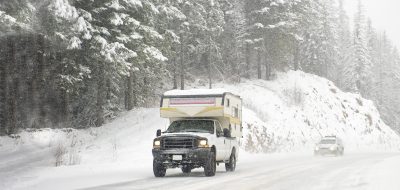With Old Man Winter on his way, it’s time to start thinking about maintenance. I know…most people talk about maintenance during the travel season, or right before it—but I know a lot of RVers, particularly on the west coast, that use their RVs all season long. In particular, it’s important to pay attention to your brakes and tires because the roads are getting wet and slick.
Some people I’ve met seem to think that if they’ve got ABS brakes, they don’t have anything to worry about—but they are just as susceptible to the effects of water as any other brake system. They may have “anti lock” in the name, but they can lock if corrosion sets in, or too much water gets into the brake system. You may recall a few months back that I talked about how brake fluid is hydroscopic—in other words, it attracts water. This water can lead to corrosion of critical components, but it also lowers the boiling point of the brake fluid, which leads to brake fade. The last thing you need when you’re already battling the elements is brake fade—you want all the braking power you can get. Typically, we recommend that a brake system be flushed every two-three years, regardless of mileage. If you live in a damper climate, you should change the fluid more often. Moreover, consistent exposure to wet roads can cause corrosion and subsequent sticking to the calipers and slides, bushings and pins. A regular brake inspection is always a good idea to make sure that the components are working properly and that some pads are not wearing more quickly than others.
If you’ve been holding off on purchasing new tires, now is the time to get them—this is the time of year when you’ll need as much traction as possible. Constant exposure to moisture can wash away lubricants, too, so pack those bearings (if they’re not the cartridge type) and make sure your king pin, U joints and chassis components are well lubricated as well. We like to use Lubrication Engineers 3750-3752 Almagard Vari-Purpose Lubricant for these components, because it has excellent wear resistance and clings to metal even under strong water spray.
Finally, check your headlight aiming. It’s not something a lot of us think about, but improperly aimed headlights can not only reduce your visibility, but can blind oncoming traffic.
Now…stay safe and enjoy the winter!


Pingback: site
Terri LaCrosse
How do I get water in the pump once the input line is off?
Danny
Take the input line off water pump fill pump with water put hose back on this should prime it, works on mine anyway
Rick & Gail
Sounds like your pump is full of air. If you drain completely every time you stop using it (good idea) then you need to prime it when you fill up again. I’m not sure how you need to prime your particular pump but the owners manual should tell you.
Terri LaCrosse
HELP! I went to run pink juice in my truck camper and the pump isn’t pumping anything. I had this problem before, the pump seems to work only when it wants to. When I had it looked at this spring it worked fine. The last time I went camping it wouldn’t work. The pump runs but doesn’t pump anything. I drain all the water out of the camper after each use. Any suggestions on what the problem might be. I’ve disconected and checked for debree clogging it and can’t see anything. I had the same problem last year with it and I’m wondering if it is something I’m doing wrong. Each time I’ve had it checked it works so service thinks I’m cracked.